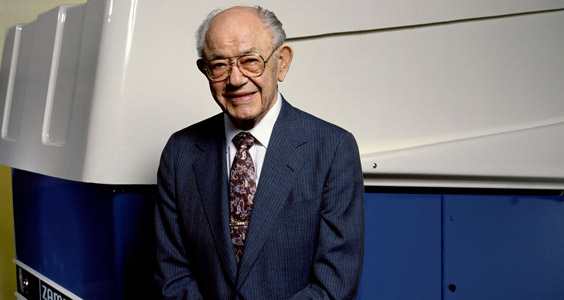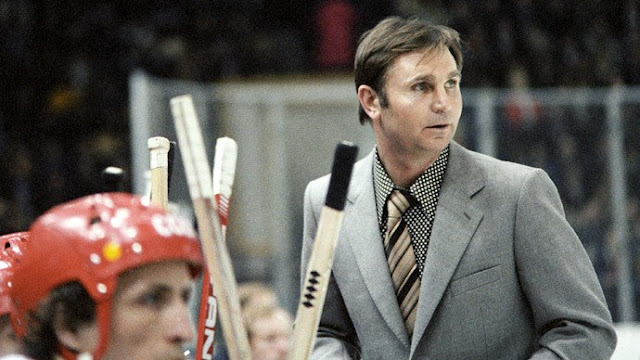Now that hockey's holy hierarchy is finally recognising a pioneer, it's time other unsung builders are given their due.
Sixty years after breaking hockey's colour barrier, Willie O'Ree is finally going into the hall of fame.
 |
O'Ree with Boston in 1958
(Photo Credit - Thomas Gillman) |
The Fredericton, New Brunswick native who played but 45 NHL games with the Boston Bruins in 1958, will be enshrined this November in the builders category. While O'Ree's induction is at least 30 years overdue, it is certainly welcome.
Hockey has always enjoyed celebrating its history and showcasing the endless stream of legendary figures who've made the sport what it is today. Unfortunately, the game does have shameful moments that have often been glossed over and even ignored.
 |
Racism kept star Herb Carnegie out of the NHL
(Photo Credit: Multicultural History Society of Ontario) |
Years before Willie O'Ree made his historic strides, Herb Carnegie spent a decade toiling in the minors. He was to many, the best hockey player NOT playing in the NHL after Jean Béliveau. In fact, the gentle giant himself stated he was always eager to watch Carnegie play in Quebec as he learnt a great deal from him. After just two seasons as teammates, Béliveau was promoted to the NHL where he would become a legendary figure of the Montreal Canadiens. Carnegie however, would never set foot on an NHL ice surface. Why? As believed by many, because of the colour of his skin.
Some have claimed that legendary Toronto Maple Leafs founder Conn Smythe felt the Quebec Aces forward had superior skills but simply couldn't bring him to the NHL because he was black. Some accounts have Smythe even uttering in jest that he would pay $10,000 to anyone who could "turn Carnegie white". While this claim has been heavily disputed by some, it nonetheless highlights a regretful time in a sport that rarely displayed diversity.
In selecting O'Ree the NHL is sending the message that it is eager to mend fences and take the next step forward. A move that should be loudly applauded.
Hockey has typically prided itself on it's builders - the great visionaries who have helped the game evolve. From Lester Patrick to Jack Adams, from Herb Brooks to Angela James. The list of people who've contributed to the foundation and continued growth of the game is quite impressive. O'Ree being given his seat at the table proves the hall of fame board is finally looking beyond individual awards and Stanley Cup championships when selecting members.
But what about the other forgotten builders? Many who like Willie O'Ree, are long overdue for recognition in hockey's ultimate shrine.
Here are 5 people who should be inducted into the builders category of the Hockey Hall of Fame.
5 - Frank Zamboni
 |
Zamboni has made tens of thousands of his famous invention
(Photo Credit: Zamboni.com) |
You know the name - well, the last name anyway. But yes, Frank Zamboni was a real person and he gave hockey one of it's greatest inventions. Made of parts from an oil derrick, a Jeep and a war plane, Zamboni developed the
"Ice Resurfacer". A machine that could smooth out an arenas ice in just 15 minutes. Prior to its creation in 1949, crews of 5 or 6
people would resurface the ice using shovels and water hoses. Nearly 70 years after it was introduced, the Zamboni is an iconic part of every rink from the NHL to local hockey associations.
4 - Viktor Tikhonov
During the Cold War tensions were high - even in hockey.
 |
Tikhonov was the unquestioned ruler of Soviet teams.
(Photo Credit: Dmitri Donskoy) |
The
"Red Army" and its coach Viktor Tikhonov were universally feared. Ruling with an iron fist, Tikhonov's militaristic approach was harsh to many, though few could argue the results. Tikhonov would guide his teams to eight world championships, three Olympic gold medals and one silver, as well as a stunning upset of Canada in the 1981 Canada Cup. A man who coached legends like
Valdislav Tretiak and
Vladimir Krutov as well as future superstars
Pavel Bure, Alex Molgilny and
Vladimir Konstantinov, Tikhonov was a brilliant hockey mind the hall has ignored for too long.
3 - Gary Davidson & Dennis Murphy
If there's one thing the Hockey Hall of Fame loves to ignore, it's anyone who had anything to do with the
World Hockey Association. For seven long years, the WHA competed against the NHL for both players and fan support. In 1979 the two leagues merged
- the NHL stubbornly called it an expansion - and the
Quebec Nordiques, Hartford Whalers, Edmonton Oilers and original
Winnipeg Jets joined the established league. The league, founded by Gary Davidson and Dennis Murphy, went to war with the NHL after signing mega star
Bobby Hull.
 |
Gary Davidson (L) & Dennis Murphy
(Photo Credit: I-Stock) |
While the WHA lasted only seven years, it changed many aspects of hockey for the better. It successfully fought to strike down the NHL's reserve clause which chained players to lifetime contracts. It showcased European talent which the NHL had frequently dismissed as
"soft". And perhaps most important of all, the league dressed young talents like
Wayne Gretzky and
Mark Messier which lead to the NHL lowering its draft age. Davidson and Murphy have long been denied as builders thanks to former hall of fame committee members, many of whom fought the WHA tooth and nail during the
7 Year War. With a more forward-thinking committee in place, the induction of the WHA's founders is a no-brainer.
2 - James Creighton
Everyone loves to watch hockey. Well, now they do. James Creighton deserves a big thank you for that.
 |
James Creighton brought hockey from outdoor ponds to indoor rinks
(Photo Credit: |
An athlete and scholar who later in life would go on to serve as law clerk to the Canadian Senate, Creighton loved hockey but felt it was missing one thing - structure. So on March 3, 1875 he organised the
world's first recorded indoor hockey game. The match which was held between members of Montreal's Victoria skating club, featured a wooden puck, 9 players per side and was held in a rink measuring more than 200ft in length.
Thanks to a notice in the
Montreal Gazette the match was well attended as many were curious to see what all the fuss was about. The game was fast and physical and in spite of a fight breaking out afterwards between players and club members who were upset over the condition the ice had been left in, those in attendance loved what they saw.
James Creighton should not only be inducted for organising a pivotal moment in hockey history, he should as well for being a tireless promoter of the game. After moving to the Ottawa area he continued to foster hockey's development. He established a hockey club comprised of government employees called the
Rebels and added his friends William and Arthur Stanley to the team. The Stanley brothers would inspire their Father,
Lord Stanley to donate a silver trophy to Canada's best hockey team. That trophy would soon be known as the
Stanley Cup. If the hall of fame has a builders section, then James Creighton the
"Father of Hockey" should be in it.
1 - Abby Hoffman
 |
Abby Hoffman was kicked off her team because she was a girl
(Photo Credit: City of Toronto Archives, Fonds 1257, Series 1057, Item 3185) |
Like many Canadians, Abby Hoffman could skate when she was three years old. By age 9 she was a star on the blue line for the St. Catharines Tee-Pees and was chosen to play in a charity all-star game. She was by all accounts, a brilliant young player who would likely have a great future in hockey. There was just one small problem -
no one realised that Abby was a girl. With their daughter desperately wanting to play and no girls teams in the area, Hoffman's parents cut her hair short and signed her up for the Tee-Pees under the name
"Ab Hoffman". Upon discovering
"Ab" was really Abigail, Hoffman was kicked off the team. In protest, her parents took their fight to the
Ontario Supreme Court. The case garnered attention from news outlets across North America including
Time Magazine. In its ruling, the court sided with Hoffman and further decreed that hockey associations must in fairness, offer both a boys' and girls' team.
Hoffman's victory was a major step forward in both developing and advancing the women's game. In the years since her historic fight, registration for girls hockey has risen exponentially and the idea of girls playing Canada's game is now a foregone conclusion. While Hoffman moved on from hockey to track and field where she won numerous international medals, the game owes her more than perhaps even she realises. A lot has changed for the better in hockey since 1956. Abby Hoffman needs to be recognised by the hall of fame for championing the cause for girls who simply wanted to play the game.



























